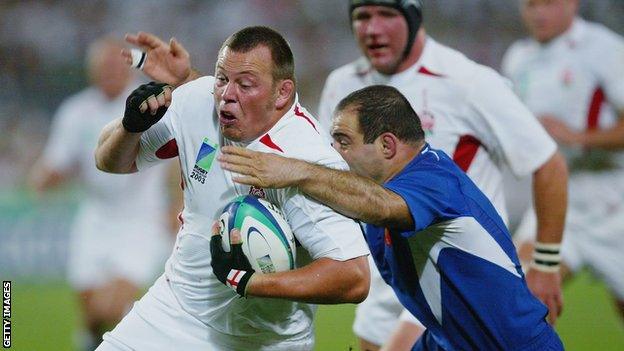Sports-related brain injury: New research finds links between repetitive head impacts & degenerative brain disease
- Published

Former England hooker Steve Thompson has said he will donate his brain to scientists researching CTE
Sport governing bodies have been called on to acknowledge that repetitive head impacts cause a degenerative brain disease after new research found a causal link between the two.
The authors say they have found "conclusive evidence" that repetitive head impacts cause chronic traumatic encephalopathy (CTE).
"Sport governing bodies should not mislead the public on CTE causation while athletes die and families are destroyed by this terrible disease," lead author Dr Chris Nowinski said.
Sports organisations, government officials, parents and the military have been asked to put preventative measures in place.
The study was carried out by researchers from Oxford Brookes University and 12 other academic institutions, alongside analysis from the Concussion Legacy Foundation.
One co-senior author said they were "surprised at how strong the causal relationship is between repetitive head impacts and CTE".
"This analysis shows it is time to include repetitive head impacts and CTE among other child safety efforts like smoking, sunburns and alcohol," Dr Adam White, executive director of the Concussion Legacy Foundation UK, said.
"Repetitive head impacts and CTE deserve recognition in the global public health discussion of preventable disorders caused by childhood exposure in contact sports like football, rugby, ice hockey and others."
The research paper - Applying the Bradford Hill Criteria for Causation to Repetitive Head Impacts and Chronic Traumatic Encephalopathy - has been published in Frontiers in Neurology.
The Football Association will trial a ban on heading in England by players in matches at under-12 level from the start of the 2022-23 season.
The organisation said it welcomed the new research, adding: "We agree with the need for further awareness for parents, athletes, and policymakers.
"Next season will see new education programmes delivered by the professional leagues to all players, and we will continue working on promoting wider awareness."
Lawyers for more than 185 players are also suing rugby union's governing bodies for negligence, claiming that playing the sport caused brain damage.
The most studied causes of CTE are caused by contact and collision sports such as football, rugby and American football.
What is CTE?
CTE is the disease found by Dr Bennet Omalu in the brain of American football player Mike Webster, and the subject of the film Concussion starring Will Smith. In 2011, a group of former American football players started a class action against the NFL and won a settlement worth about $1bn.
Omalu was the first to find physical evidence linking sports-related brain injury and CTE.
CTE can develop when the brain is subjected to numerous small blows or rapid movements - sometimes known as sub-concussions - and is associated with symptoms such as memory loss, depression and progressive dementia.
Sub-concussions cannot be detected on the pitch or in any post-match examination.
The disease can only be diagnosed in a brain after death, but some experts believe if history of exposure is evaluated, it is reasonable to conclude that the risk increases.
It has been found in the brains of dozens of former NFL players, as well as a handful of deceased footballers.
Dr Omalu spoke to the Scrum V podcast in December, 2020 and you can listen to that interview here.

'I thought one day I'd be in that band': Ronnie Wood talks candidly about his life as a Rolling Stone
A telescope designed to unfold in space: Could it be the first to detect signs of life on a distant planet?
